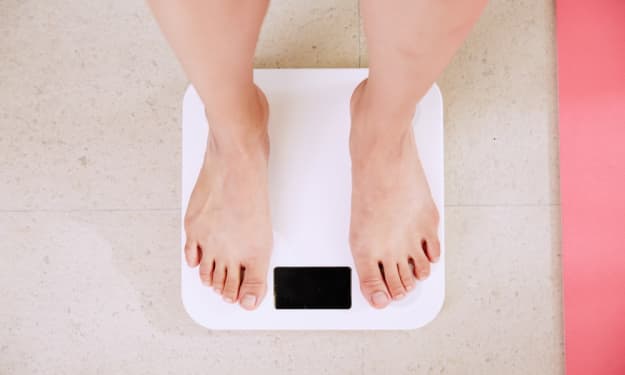Creating a Healthy AND Cost-Efficient Lifestyle
When You're Stuck On, Good Food Costs Too Much

So, you hate that healthy food is so expensive, Huh? Well I am glad. I used that information to lure you here to learn some neat ways to save money or reduce the costs of fitness and health, so you can start buy the healthy stuff, or anything else instead. Either way, Just quit asking why healthy food is so expensive all the time, Please? I am even willing to help you. By reading this article, you will learn new ways to keep yourself fit and your finances free.
Living a healthy lifestyle doesn't have to be expensive. With careful planning and mindful choices, you can prioritize your well-being without breaking the bank. A healthy and cost-efficient lifestyle is not only sustainable but also offers long-term benefits for your physical health and financial stability. In this article, we'll explore practical tips and strategies to adopt a healthy and cost-efficient lifestyle, empowering you to thrive both physically and financially.
Meal Planning and Home Cooking
One of the most significant expenses for many individuals is eating out or ordering takeout regularly. By adopting a meal planning approach and cooking at home, you can save money while maintaining a nutritious diet. Plan your weekly meals, create a shopping list, and buy groceries in bulk to take advantage of discounts and reduce food waste.
Pretty sure you're not going to stop being a carnivore. Then the Manager's Special or Butcher's Deal is perfect for you. These little deals are usually revealed with a red sticker on packages of meat in the meat department. They are special deals of the day on fresh meats and sea food.
I know what you're thinking, and you are wrong. Reduced cost doesn't mean reduced quality. Typically, the price is reduced because the meat may be getting close to its sell time cut-off, but is still great to cook or freeze. Grocer's and Markets have strict guidelines they must follow about sale times and fresh foods. The sell time is way sooner than the time it takes for the meat to go bad or discolor. Using the Manager's Special remains a great way to cut costs and eat fresher.
Bonus Bit:
Are bulk amounts too much for you? Gather some friends and form a shopping team in which everyone pitches in for bulk groceries, then split it all among the members. This way you're saving more, and doing so with your friends. Win, Win.
In Season Veggies and Fruits
Plant-based diets are not only beneficial for your health but can also be more budget-friendly than meat-based diets. Incorporate more fruits, vegetables, grains, and legumes into your meals to save on grocery expenses. Explore affordable protein sources like lentils, chickpeas, and tofu for a balanced and cost-effective diet.
Always try to buy fruits and vegetables that are in season. This garuntees a cheaper price for that particular fruit. Buying off season can more than triple the price. That's enough to make me stick with in-season nature-made delights.
Exercise Outdoors and at Home
Gym memberships can be costly, but there are plenty of ways to stay active without spending a fortune. Take advantage of outdoor activities like hiking, jogging, and cycling, which are not only free but also provide opportunities to connect with nature. Additionally, utilize online workout videos and home exercise routines to stay fit without the need for expensive gym equipment.
Let's be honest about something, here. More than not, people buy gym memberships that usually sits on the counter or bedside table more than in a locker at the gym. Here's a good rule of thumb: If you haven't completed a three days a week work out that entail sit-ups, push-ups, pull-ups, burpees, cardio, weight-free squats, and a simple cardio such as running, mildly challenging hiking, or even the embarrassing fast walking, for at least 1 month (but preferably 3 months) without missing more than 2-3 days, buying a gym membership is going to be a waste of money.
Stay Hydrated with Tap Water or Water Rich Foods
Bottled water can add up over time and strain your budget. Opt for tap water, which is safe and readily available in most areas. Investing in a reusable water bottle can also save you money and reduce plastic waste, benefiting both your wallet and the environment.
I'm definitely not a Healthologist by education, trade, or even make-believe. However, when drinking bottled water, you're not only inviting more plastic particula into your body, there's a good chance you're not going to always be able to recycle and thereby causing everyone else a detriment.
Further, When hydrating, consider fruits and vegetables with a high water content (pending a real physician's, dietician's, or healthologist's approval of course). By getting hydrated with ruffage you're going to remain hydrated longer and the water won't be running straight through, making everyone at the meeting wait for you to return from the restroom for the 3rd time in fifteen minutes. Got me, Splash? (Linda from your work calls you Splash behind your back)
Utilize Free or Low-Cost Community Resources
Many communities offer free or low-cost resources for health and fitness. Look for local parks, recreational centers, or community centers that provide fitness classes, yoga sessions, or walking groups. These activities offer opportunities to socialize and stay active without incurring additional expenses.
Your town might not have an outdoor free fitness center (but I am being serious when I say, your town probably has something equal to or similar, really), but fear not! It's a, too lazy to verify if it's a proven fact, that every city, town, village, and most hamlets come pre-installed with things called, sidewalks. there are millions of ways to use them for cardio. Well, actually about four of five, including running, Jogging (running for slow people), fast walking (an embarrassing form of jogging for people who don't run), and walking (yep, just good ol' fashioned walking).
As far as weight training, there are multiple ways to turn common household items into weighted exercise implements. Just like the gym membership, free weights are an extra expense, and not worth the cost to become doorstops.
Being serious yet again, which is twice now, by the way, I honestly have always maintained the point of view that if I can not follow a 3 days per week, in-home/outside fitness workout for a few months, there isn't a reason to blow money on equipment. It takes very little to develop a free and effective fitness plan that utilizes open community parks and fitness centers, the outdoors, and common household items. You can't get less expensive than that.
Bonus Bit:
If you are like me and aren't really interested in socializing while exercising outside, there are always earbuds. Whether you really use them or not, people won't try to talk to you if you have them in.
... Except for that one kid who always has to ask fifteen questions a minute and thinks he can walk in any yard like his parents own all of them. Yeah, he'll talk to you either way. Yeah, e definitely sucks.
Make Use of Health Insurance Benefits
Take advantage of the preventive care benefits offered by your health insurance. Regular check-ups, vaccinations, and screenings can help you identify and address potential health issues early, preventing costly medical expenses down the road.
Many insurance plans have easter-egg benefits, that is free and reduced products and services about which many people have no clue. This could be a spending allowance for vitamins and supplements, bonuses for going to the gym or even free gym memberships to select facilities (the only cost of a membership that is acceptable until you know if the gym is going to be a regular thing or just another high-priced nothing.
...probably should have had something fancier there at the end.
DIY Projects
Learning basic DIY skills can save you money on home repairs and maintenance tasks. From simple home improvements to repairing clothing, embracing DIY projects can help you avoid costly professional services and contribute to a sense of accomplishment.
These skills can also save money while building your own workout center or fitness equipment. Being DIY savvy is hard to accomplish, and there's a world of ideas free to access that can help with fitness, health, and other things at low or no cost.
Prioritize Mental and Emotional Well-Being:
Taking care of your mental and emotional health is essential for your overall well-being. Engage in activities that reduce stress and promote relaxation, such as meditation, spending time with loved ones, or pursuing hobbies. Good mental health leads to better decision-making and financial management.
I'm not going to make a snide comment or joke here. Mental and emotional well-being is important for everyone and should be at the top of the list. Know what makes you good, and know what signs to look for when you might be slipping into not good. Keep yourself in a good state using any number of treatments, self-help books, (the Power of Now, by Eckhart Tolle, was so relevant and profound, that I bought eight other copies and gave them to my closest friends and family. Well, friends.)
Conclusion
Adopting a healthy and cost-efficient lifestyle is within reach for everyone. By making mindful choices, planning your meals, and incorporating more physical activity into your routine, you can improve your well-being while saving money. Embrace the simplicity of home-cooked meals, tap into community resources, and prioritize preventive health care to promote long-term health and financial stability.
Dwelling on the negative or common statement we use to put off doing what might be good for us, like: Why does healthy food cost so much? Prevents us from finding options that we might just love and benefit us even more than the things we think we can't use.
Always change your perspective when stuck, even with fitness and finance. Who knows, you might end up being a person who doesn't ask why healthy food costs so much. Maybe you'll become one of the few that ask instead:
Why does junk food cost so little?
Thanks for your Time,
D.J. Rees, July 2023
About the Creator
The Next Plan
Just your everyday next thing on your list. Adding the next idea, the next gizmo, and the next everything else. Here to help you with all the next things you haven't thought of, Thanks for reading, The Next Plan






Comments
There are no comments for this story
Be the first to respond and start the conversation.